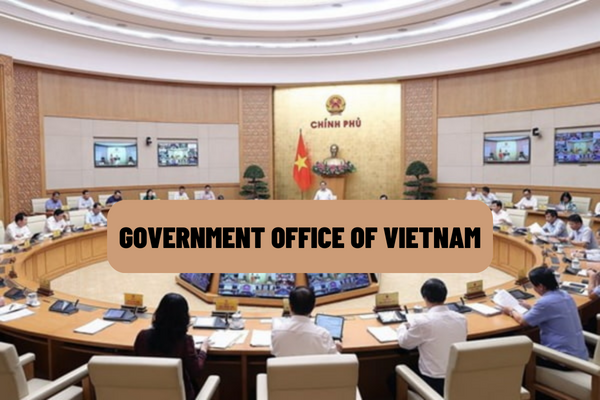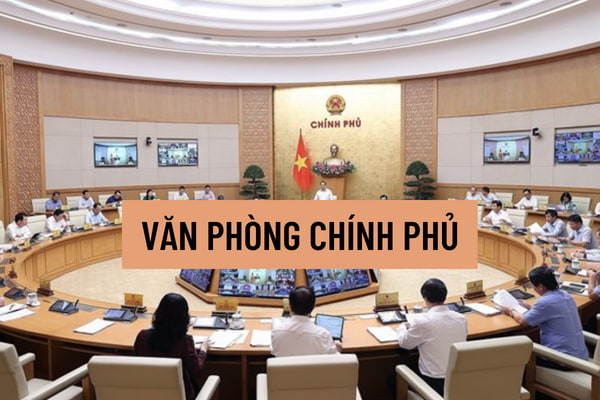What is the Government Office of Vietnam? What are the tasks of the Government Office of Vietnam in the structure of the State apparatus?
What is the Government Office of Vietnam?
According to the provisions of Article 1 of Decree No. 79/2022/ND-CP, the Government Office is a ministerial agency of the Government, an assisting apparatus of the Government and the Prime Minister.
Functions of the Government Office include: advise on general affairs and coordinate activities to assist the Government and the Prime Minister (including Deputy Prime Ministers) in organizing the Government's general activities, directing and administering the operation of the Government and the state administrative system from the central to grassroots level, ensuring the uniformity, smoothness and continuity of the national administrative system; control administrative procedures; ensure information to serve the Government’s and the Prime Minister’s leadership, direction and administration work and provide information to the public in accordance with law; and ensure material, technical and logistical conditions for the operation of the Government and the Prime Minister.

What is the Government Office of Vietnam? What are the tasks of the Government Office of Vietnam in the structure of the State apparatus? (Image from the Internet)
What are the tasks of the Government Office of Vietnam in the structure of the State apparatus?
Article 2 of Decree No. 79/2022/ND-CP stipulates the tasks and entitlements of the Government Office in the structure of the State apparatus as follows:
- Advise on general affairs and coordinate activities to assist the Government and the Prime Minister, specifically:
+ Formulating and managing the Government and the Prime Minister's work programs in accordance with law;
+ Examining the order, procedures and competence for handling and providing advices on contents; giving its own opinions on schemes, projects, draft legislative documents and reports according to the Prime Minister’s work programs and other tasks submitted by ministries, central authorities, the provincial People's Committees and related agencies and organizations;
+ Taking charge and cooperating with ministries, central authorities, the provincial People's Committees and related agencies and organizations in finalizing contents, procedures, documentation and draft documents about other regular tasks which have to be submitted to the Prime Minister for consideration and decision by these ministries, central authorities, the provincial People’s Committees and related agencies and organizations;
+ Assisting the Prime Minister in regulating and coordinating operations of ministries, central authorities and the provincial People's Committees in the process of formulation and implementation of policies and laws; the operation of interdisciplinary collaboration councils, committees, steering committees and organizations headed by the Prime Minister in accordance with law;
+ Requesting the Government or Prime Minister to consider assigning ministries, central authorities, the provincial People's Committees and related agencies and organizations to formulate mechanisms, policies, schemes, projects and draft legislative documents for submission to competent authorities for decision; or taking the initiative in studying and proposing mechanisms and policies to be submitted to the Government or Prime Minister for consideration and decision;
+ Taking charge and cooperating with ministries, central authorities, the provincial People's Committees and related agencies and organizations in formulating work reports, explanations and answers to inquiries of the Government and Prime Minister before the National Assembly, National Assembly Standing Committee, the President, competent agencies and the People under the Prime Minister's direction;
+ Presiding over the drafting and editing of articles, speeches, answers to press interviews and documents for the Prime Minister and other reports and documents under the Prime Minister's direction;
+ Monitoring, urging and examining the performance of tasks assigned by the Government or Prime Minister to ministries, central authorities, the provincial People's Committees and related agencies and organizations; proposing the Prime Minister for necessary measures to urge the performance of these tasks, overcome shortcomings and ensure observance of administrative rules and disciplines and the effectiveness and efficiency of state management;
+ Taking charge and cooperating with ministries, central authorities, the provincial People's Committees and related agencies and organizations in preparing contents to serve meetings, works and local/grassroots-level tasks of the Prime Minister;
+ Attending meetings and conferences of ministries, central authorities, the provincial People's Councils and People's Committees and related agencies and organizations; requesting ministries, central authorities, the provincial People's Committees and related agencies and organizations to provide related documents and data; reporting the performance of tasks assigned by the Government or Prime Minister; participating in Councils, Committees, Steering Committees and inter-sectoral cooperators headed by the Prime Minister according to regulations; taking the initiative in working with ministries, central authorities, the provincial People's Committees and agencies and organizations to grasp the situation in service of the Government's and Prime Minister's leadership, direction and administration work;
+ In case there still have arguments about the issues submitted to the Government or Prime Minister, the Head of the Government Office shall preside over meetings with leaders of ministries, central authorities, the provincial People's Committees and related agencies and organizations in order to exchange and reach agreements, or clarify issues on which arguments remain before submitting them to the Government or Prime Minister;
+ Returing and clarifying reasons or transfering documents to competent agencies for handling if the documents are incomplete, do not follow the procedures, regulations or exceed the Government’s or Prime Minister’s competence or documents of which agencies do not clearly propose solutions;
+ Formulate schemes, projects, draft legislative documents and other documents when assigned by the Prime Minister.
- Regarding the control of administrative procedures
+ Guide, monitor, urge and inspect the performance of administrative procedure control of ministries, central authorities and the provincial People's; summarize the progress and results and report them to the Government and Prime Minister;
+ Take charge of reforming administrative procedures and implementing single-window systems and interlinked single-window systems for handling administrative procedures at state administrative agencies; disseminating information about the reform of administrative procedures;
+ Request the Government and the Prime Minister to assign ministries, central authorities and the provincial People's Committees to study and propose policies, solutions and initiatives for reform of administrative procedures and relevant regulations or proactively study and propose them; assess and handle results of review of administrative procedures according to law;
+ Taking charge and cooperating with ministries, central authorities, the provincial People's Committees and related agencies and organizations in developing, managing and operating National Database on administrative procedures and the National Public Service Portal; performing related tasks assigned by the Government or the Prime Minister;
+ Receiving and processing reports and proposals of organizations and individuals on administrative regulations under the management of the Government, the Prime Minister and state administrative agencies in accordance with law;
+ Performing standing duties of the Advisory Council for Administrative Procedure Reform.
- Assurance of information serving the Government’s and Prime Minister’s leadership, direction and administration work
+ Make periodic, thematic and ad hoc reports as prescribed;
+ Receive information, take the initiative in monitoring, coordinating and grasping the practical progress to promptly advise and propose the Government or Prime Minister for consideration and direction of handling urgent and burning issues and public opinions of public concern;
+ Provide information to Government members, Heads of governmental agencies, Chairpersons of the provincial People's Councils and People's Committees, Communist Party and State agencies and related agencies and organizations on the national socio-economic situation and the Government's and Prime Minister's leadership, direction and administration work according to regulations;
+ Take charge and cooperate with ministries, central authorities, the provincial People's Committees and related agencies and organizations in developing, managing and operating information systems and databases assigned by the Government and Prime Minister; connect, coordinate, integrate and share information between the Government Office and ministries, central authorities and the provincial People's Committees to serve the Government's and Prime Minister's leadership, direction and administration work in accordance with law;
+ Preside over the guidance and urge ministries, central authorities and the provincial People's Committees to send and receive electronic documents; deal with administrative procedures in the electronic environment; implement reporting regimes intended for the Government’s and Prime Minister's direction and administration in accordance with regulations.
- Provision of information to the public;
- Ensure material, technical and logistical conditions for activities of the Government and the Prime Minister.
- Formulate and promulgate legislative documents and other documents within the Government Office’s competence in accordance with law.
- Perform tasks of inspecting documents and handling illegal documents within its competence and according to regulations of law.
- Receive and process documents submitted by ministries, central authorities, the provincial People's Committees and related agencies, organizations and individuals to the Government and Prime Minister; issue and manage documents of the Government and Prime Minister; formulate, manage and operate an e-document storage system at the Government Office in accordance with law.
- Conduct inspections; receive citizens, settle complaints and denunciations; prevent and control corruption, practice thrift and anti-waste in accordance with the provisions of law.
- Summarize and provide professional guidance on office work for offices of ministries and central authorities and offices of the provincial People's Committees.
- Manage organizational apparatus, official payroll, number of employees and working positions; decide recruitment, employment, management and implementation of other regimes and policies for officials and public employees under its management as prescribed.
- Decide and direct the execution of administrative reform and digital transformation programs under its competence according to the objectives, contents and overall state administrative reform programs.
- Manage finance, assets and other resources assigned to it; manage scientific research activities; enter into international cooperation in accordance with law.
How many agencies, units and organizations does the Government Office of Vietnam have?
Pursuant to the provisions in Article 3 of Decree No. 79/2022/ND-CP on the organizational structure of the Government Office as follows:
Organizational structure
1. Department of General Affairs.
2. Department of Legal Affairs.
3. Department of General Economics
4. Department of Industry.
5. Department of Agriculture.
6. Department of Science, Education, Culture and Social Affairs
7. Department of Enterprise Innovation.
8. Department of International Relations.
9. Department of Internal Affairs.
10. Department of State Administrative Organization and Public Affairs.
11. Department of Complaint, Denunciation and Anti-corruption Monitoring (Department I).
12. National Assembly, Local Government and Association Affairs.
13. Department of Secretarial and Editorial Affairs.
14. Department of Administration.
15. Department of Organization and Personnel.
16. Department of Finance and Planning.
17. Department of Administrative Procedure Control.
18. Bureau of Management.
19. Bureau of Administration and Management II.
20. Vietnam Government Portal (chinhphu.vn, vietnam.gov.vn).
LawNet
